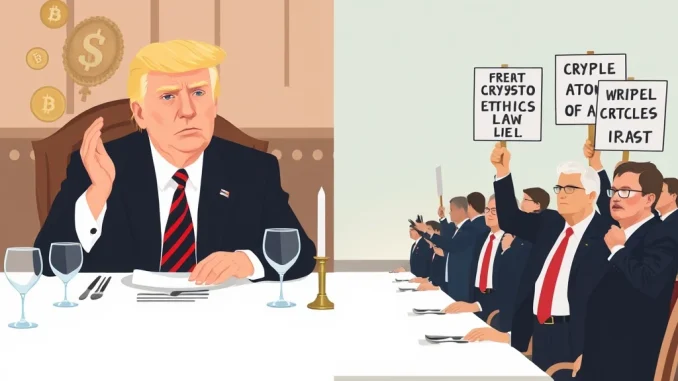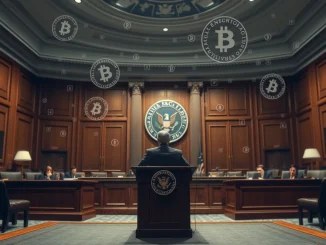
The intersection of politics and cryptocurrency continues to heat up, and a recent event involving former President Trump has ignited a firestorm. A dinner hosted by Trump for memecoin investors has quickly become a flashpoint, drawing sharp criticism and sparking protests from prominent Democratic lawmakers. This gathering, seen by critics as an example of concerning ties between political figures and potentially speculative digital assets, is pushing the debate around government ethics crypto to the forefront.
Why is the Trump Memecoin Dinner Causing a Stir?
The event in question was a dinner held at Trump’s golf club near Washington, D.C., reportedly attended by significant figures in the crypto space, including Tron founder Justin Sun. While details about the specific discussions remain private, the nature of the attendees – particularly those associated with memecoins, often seen as highly volatile and speculative assets – has raised eyebrows.
Critics argue that a former President engaging directly with investors in such assets, especially at a private event held at one of his properties, creates an appearance of potential conflict of interest or influence peddling. This event serves as a potent example in the ongoing discussion about political crypto donations and the broader influence of the crypto industry in Washington.
Lawmakers Push for a Ban on Officials Profiting from Crypto
In response to the Trump memecoin dinner and similar concerns about politicians’ involvement with digital assets, Democratic lawmakers are taking action. Leaders like Representative Maxine Waters and Senators Elizabeth Warren and Chris Murphy are spearheading efforts and planning to introduce legislation aimed at preventing federal officials from profiting from cryptocurrency holdings or related activities while in office.
Their primary argument centers on the potential for corruption and the need for transparency. They contend that officials who hold significant crypto assets could face conflicts of interest when making decisions or voting on legislation that impacts the crypto market. The proposed lawmakers crypto ban seeks to eliminate this perceived conflict, aligning crypto with existing rules regarding other financial assets.
Key points driving the lawmakers’ push include:
- Allegations that political figures could use their position or access to information to benefit their personal crypto investments.
- The highly volatile nature of many crypto assets, making potential profits or losses significant and potentially influencing decision-making.
- The broader goal of increasing transparency and trust in government by limiting potential financial conflicts of interest.
The Future of Crypto Regulation and Political Involvement
This incident highlights the increasing entanglement of the cryptocurrency world with mainstream politics and the urgent need for clear guidelines. The push for a lawmakers crypto ban is part of a larger conversation about comprehensive crypto regulation in the United States.
Implementing such a ban would involve significant challenges, including defining what constitutes ‘profiting’ from crypto, establishing disclosure requirements, and enforcing the rules across various digital asset types. However, proponents argue it is a necessary step to maintain the integrity of public office.
The controversy surrounding the Trump memecoin dinner underscores the growing scrutiny on how politicians interact with the crypto industry. As political crypto donations and lobbying efforts continue to rise, expect to see more debates and legislative proposals aimed at addressing the ethical considerations and potential conflicts of interest that arise when digital assets intersect with public service.
Summary: A Political Wake-Up Call for Crypto
The dinner hosted by former President Trump for memecoin investors has served as a catalyst, bringing long-simmering concerns about political involvement in crypto to a boil. Lawmakers are now actively pursuing a lawmakers crypto ban for federal officials, citing the need to prevent corruption and uphold government ethics crypto standards. This event and the resulting push for stricter rules signal a critical phase in the relationship between Washington and the digital asset space, emphasizing that increased regulatory attention and ethical considerations are likely to shape the future of crypto regulation.



